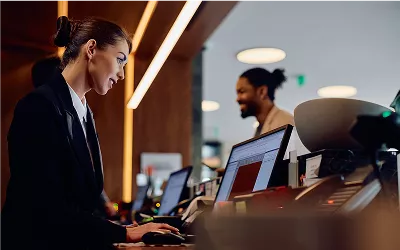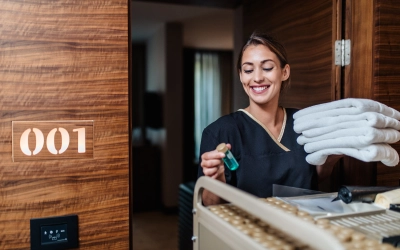Les gens adorent dire à quel point notre industrie est en retard en matière de technologie.
Mais les logiciels hôteliers se développent plus rapidement que jamais, et les hôteliers sont de plus en plus enthousiastes à l'idée d'adopter les nouvelles technologies.
Il y a deux raisons principales à cela.
Tout d'abord, les clients d'aujourd'hui s'y attendent. Les voyageurs sont plus férus de technologie et sont moins enclins à se passer de leurs outils préférés lorsqu'ils sont sur la route.
Deuxièmement, les défis permanents liés au personnel et aux coûts d'exploitation élevés obligent les hôtels à rechercher des solutions plus rentables. Cela implique souvent la mise en œuvre de nouveaux logiciel d'accueil.
En résumé, il est essentiel de tirer parti des dernières technologies pour assurer la viabilité de votre entreprise du point de vue des clients, des opérations et des investisseurs.
Tout tourne autour de l'expérience client
Les logiciels hôteliers sont un outil puissant qui permet d'améliorer l'expérience de vos clients tout au long du parcours client. Imaginez à quel point un bon moteur de réservation est pratique ou combien de temps l'enregistrement et le départ sans contact peuvent vous faire gagner.
Mais ce n'est pas tout ! Voyons comment vous pouvez utiliser la technologie pour tirer des enseignements du séjour de chaque client et continuer à trouver de nouvelles façons d'offrir un service de meilleure qualité et plus personnalisé.
Collecte et analyse des commentaires des clients
Vous le savez déjà : il est essentiel de comprendre ce que vos clients pensent de leur séjour. Mais il peut être difficile de demander des commentaires à tous les voyageurs lors du départ. Ils sont souvent pressés de prendre leur vol ou votre personnel doit être rapide car de plus en plus de personnes font la queue.
Récemment, le paiement sans contact n'a fait qu'ajouter au défi, car il permet de ne plus avoir la possibilité de demander des commentaires en personne.
Heureusement, il existe un logiciel hôtelier capable d'automatiser la collecte de commentaires. Il s'adresse sans faute à tous les invités et leur demande leurs commentaires. Ensuite, il encourage les voyageurs les plus heureux à partager leur avis sur TripAdvisor ou Google. Cela peut augmentez vos avis 5 étoiles jusqu'à 350 %!
Mais tu n'as pas encore terminé. Analysez vos avis pour identifier les tendances et les plaintes les plus courantes, afin de pouvoir corriger la situation.
Restauration des services et résolution des problèmes en temps réel
L'enregistrement auprès de vos clients pendant leur séjour est le meilleur moyen de leur garantir une expérience mémorable. Cela vous donne également la possibilité de découvrir et de résoudre les problèmes alors qu'ils sont encore en interne. Les clients se sentent ainsi valorisés et vous avez l'occasion de les épater avec un excellent service.
Dans le passé, cela n'était possible qu'en appelant les personnes présentes dans la chambre ou en leur demandant en personne s'ils venaient à la réception. Comme on pouvait s'y attendre, de nombreux problèmes n'ont pas été signalés et vous ne les avez peut-être appris que par le biais d'un avis négatif.
Vous pouvez désormais tirer parti outils de communication pour les clients pour assurer un suivi automatique auprès de tous les voyageurs. Cela vous fait gagner du temps et donne à chaque client la possibilité de répondre à des demandes, des questions, des éloges ou des plaintes. Votre équipe pourra ainsi intervenir plus facilement là où c'est nécessaire.
Gestion de la réputation et surveillance des avis en ligne
Avec autant de sites d'évaluation disponibles, il peut sembler impossible de tous les surveiller et de les gérer. C'est là que les outils de gestion de la réputation entrent en jeu. Utilisez-les pour recueillir des avis sur toutes les plateformes et garder une vue d'ensemble de votre réputation en ligne sur un tableau de bord centralisé.
Cela permet également de répondre plus facilement à tous les commentaires récents et de les analyser pour découvrir des thèmes communs. Tout comme pour les commentaires directs des clients, les logiciels peuvent vous aider à accélérer ce processus, afin que vous disposiez de plus de temps pour travailler sur la solution et interagir avec vos clients.
La sécurité et la protection des données n'ont jamais été aussi importantes
Malheureusement, les violations de données ne sont pas une nouveauté dans le secteur de l'hôtellerie. Certaines des plus grandes marques en ont été victimes. Le fait que même les grands groupes dotés de grandes équipes informatiques soient confrontés à ce problème montre que notre secteur a encore un long chemin à parcourir en matière de sécurité des données. Voici quatre mesures que vous pouvez prendre pour protéger vos données.
Confidentialité et sécurité des données dans les logiciels hôteliers
Lors de la rénovation ou élargir votre infrastructure technologique, il est essentiel de ne travailler qu'avec des partenaires qui prennent au sérieux la sécurité et la confidentialité des données.
Avant de signer avec un nouveau partenaire technologique, posez-vous les questions suivantes :
- Sont-ils conformes au RGPD ? Ou suivent-ils des réglementations similaires (par exemple, le CCPA - California Consumer Privacy Act) ?
- Où stockent-ils leurs données ?
- Chiffrent-ils les données lorsqu'ils les transfèrent ?
- Le cas échéant, suppriment-ils les données après les avoir traitées ?
Les fournisseurs de technologies mettent généralement ces informations facilement à disposition. S'ils ne peuvent pas ou ne veulent pas, c'est un drapeau rouge.
Si vous avez examiné leur documentation et que vous n'êtes toujours pas sûr, faites appel à un consultant tiers en protection des données. Ils peuvent vérifier vos partenaires logiciels hôteliers existants et potentiels et vous donner des conseils impartiaux sur les personnes avec lesquelles travailler.
Conformité au secteur des cartes de paiement (PCI)
Les informations de paiement sont l'un des types de données les plus sensibles que les clients partagent avec vous. C'est pourquoi vous devez tout faire pour le protéger. Pour cela, tous les systèmes et processus de paiement doivent être Conforme à la norme PCI-DSS. Encore une fois, les fournisseurs de technologie en font généralement la publicité, mais posez-leur des questions à ce sujet pour être sûrs.
Si votre pays ou votre région dispose de réglementations locales supplémentaires, assurez-vous qu'elles sont également respectées. Enfin, vérifiez que vos systèmes de paiement sont capables de traiter les cartes d'autres pays qui peuvent nécessiter une authentification supplémentaire ou d'autres protocoles de sécurité.
Sauvegarde des données et reprise après sinistre
Les fournisseurs de logiciels devraient proposer des sauvegardes pour leurs solutions, en particulier si leurs systèmes sont basés sur le cloud. Cependant, ne vous fiez pas entièrement à eux. Conservez également votre propre sauvegarde des données critiques de l'hôtel. Vous disposez de différentes options pour cela, notamment le stockage sur site, dans le cloud ou une combinaison des deux.
Consultez votre équipe informatique pour déterminer ce qui convient le mieux à votre entreprise. Peut-être pourront-ils gérer la sauvegarde des données en interne ou recommanderont-ils de faire appel à un partenaire externe. Quoi qu'il en soit, il s'agit d'un aspect important à mettre en œuvre et à surveiller.
Formation et sensibilisation du personnel en matière de protection des données
De nombreuses violations de données sont dues à une erreur commise par un membre de l'équipe. Par exemple, ils peuvent cliquer sur un lien contenu dans un message frauduleux ou partager des informations confidentielles après avoir été invités par un e-mail de phishing.
Évitez cela facilement en sensibilisant le public aux escroqueries en ligne et en organisant régulièrement des sessions de formation sur le sujet. Cela garantit que tous les employés connaissent les risques et les différentes manières dont les cybercriminels tentent d'accéder aux données. Enfin, encouragez votre équipe à signaler tout message ou événement suspect, afin que votre équipe informatique puisse les vérifier.
Tendances et innovations futures
La technologie continue de se développer et de nous offrir de nouvelles fonctionnalités plus puissantes. Voici quelques solutions émergentes à surveiller.
Applications d'intelligence artificielle et d'apprentissage automatique
ChatGPT est l'exemple le plus célèbre d'un outil d'IA facilement accessible mais puissant aujourd'hui. Alors que nous n'avons fait qu'effleurer la surface de ses cas d'utilisation possibles, il existe déjà de nombreuses solutions technologiques hôtelières qui tirent parti de la puissance de l'IA. Par exemple, les fournisseurs de business intelligence utilisent l'IA pour rendre de grands volumes de données plus accessibles et exploitables. Et les marketeurs en profitent pour accélérer la création de contenu.
Mais il existe de nombreux autres domaines dans lesquels les fournisseurs de logiciels hôteliers utiliseront des formes d'IA et d'apprentissage automatique pour développer leurs solutions. La maintenance prédictive, la tarification et la communication avec les clients ne sont que quelques-unes d'entre elles.
Assistants et chatbots à commande vocale
Les chatbots existent depuis un certain temps et de nombreux hôtels les utilisent déjà sur leurs sites Web ou dans leur application réservée aux clients. Dans la plupart des cas, ils répondent à des questions simples (par exemple, quand est le petit-déjeuner ?) ou envoyez les demandes au service approprié (par exemple, ils informent le service d'entretien si un client a besoin de serviettes supplémentaires). Mais avec le développement rapide de l'IA, ces chatbots ainsi que les assistants à commande vocale installés dans les chambres deviendront plus polyvalents.
Bientôt, ils seront en mesure d'interagir avec les gens de manière plus humaine, ce qui améliorera l'expérience de vos clients. Cela vous permettra de faire passer la personnalisation des séjours, la vente incitative et la vente croisée via un chatbot à un tout autre niveau.
L'Internet des objets (IoT) dans les activités hôtelières
L'IoT décrit les appareils connectés à Internet et qui peuvent être contrôlés et vérifiés à distance par les clients et/ou le personnel. Par exemple, un système de ventilation compatible IoT détecte le moment où les clients quittent la pièce et s'éteint automatiquement pour économiser de l'énergie. Les voyageurs peuvent l'activer à distance pour qu'il fasse beau et frais à leur retour. Et en cas de problème, le système en informe automatiquement le service d'ingénierie.
De nombreuses autres options sont actuellement en cours de développement, telles que les serrures sans clé que les voyageurs peuvent déverrouiller via un appareil intelligent. Ces solutions IoT offrent de nouvelles opportunités pour gérer les coûts et offrir une expérience client plus fluide. Cela permet également de se sentir plus comme chez soi lors de votre séjour à l'hôtel, car de nombreuses personnes y utilisent déjà l'IoT.
Le développement de nouveaux logiciels hôteliers ne fera que se poursuivre et même s'accélérer. Dans le même temps, les clients attendent des hôtels qu'ils adoptent des technologies innovantes et proposent une expérience de séjour moderne.
Si vous voulez rester pertinent et surmonter les défis d'aujourd'hui, l'utilisation de technologies hôtelières de pointe est votre meilleur choix.
Oui, il faut du temps et des efforts pour rester au fait des dernières tendances. Mais considérez-le comme un investissement et une opportunité. Les nouvelles technologies vous facilitent la tâche et permettent à votre équipe de se consacrer à ce que seuls les humains peuvent faire : offrir aux clients une véritable hospitalité et des interactions enrichissantes.










.webp)
.avif)

.avif)


